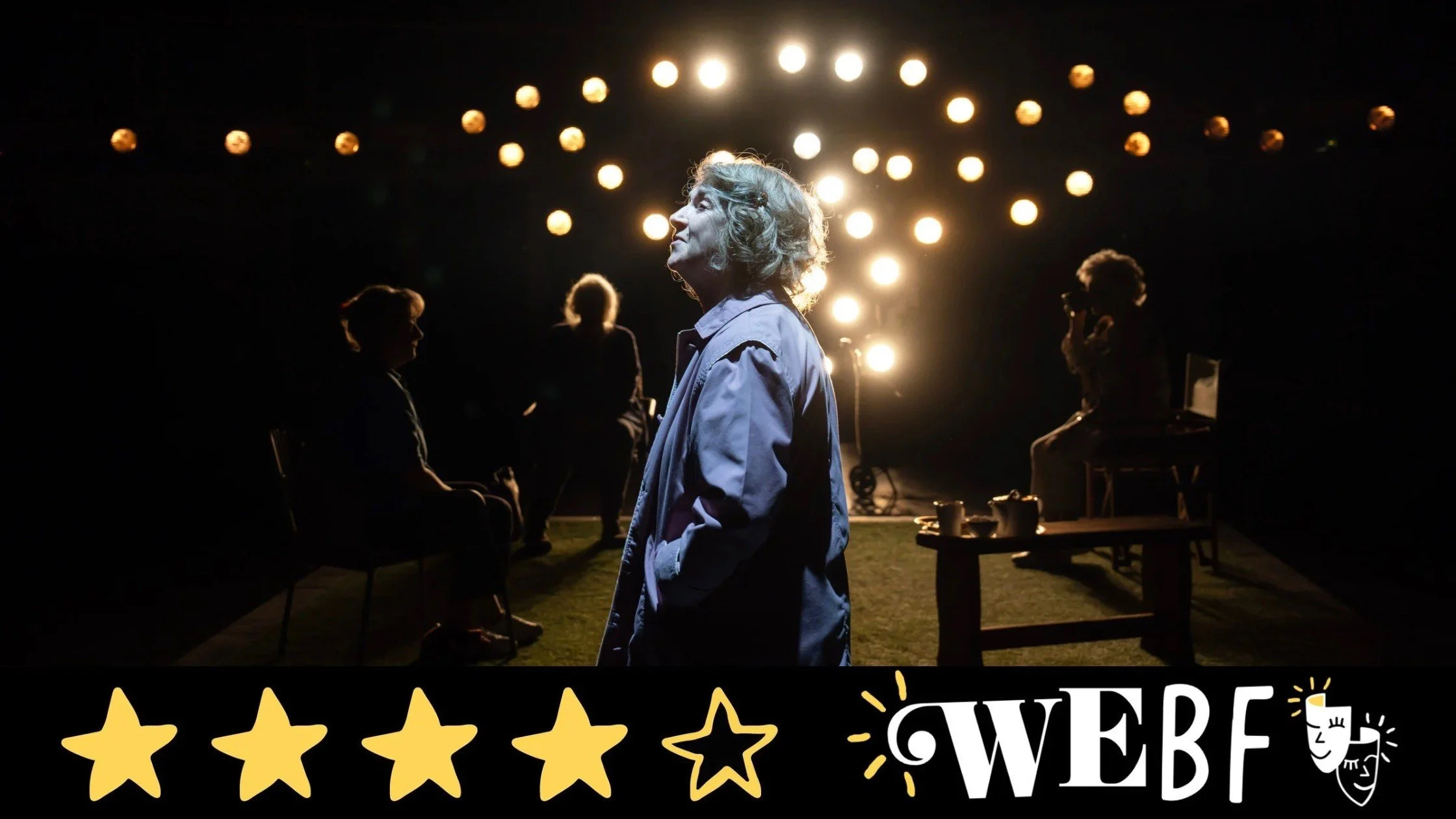Review: ESCAPED ALONE and WHAT IF IF ONLY, Royal Exchange Theatre
Photo credit: Johan Persson
Manchester’s Royal Exchange Theatre brings not just one, but two short plays by British playwright Caryl Churchill to their iconic in-the-round theatre space for the double bill of Escaped Alone and What If If Only.
With a writing career spanning over 60 years, Churchill’s work is known for exploring feminist and political themes as well as having a non-naturalistic approach to the narratives of her pieces. Both Escaped Alone and What If If Only are some of Churchill’s more contemporary works within the last ten years, but they each have a very different tone that contrasts when performed side by side in this double bill.
The first offering is Escaped Alone where we see four elderly women sat together in a garden gossiping and discussing matters of a trivial and serious nature from their lives and experiences. Intertwining with their conversation are individual monologues out to the audience, three of which are a personal reflection; Sally (Margot Leicester) and her phobia of cats that has grown in severity to develop a form of obsessive compulsive disorder, Vi (Annette Badland) opening up about killing her husband and the repercussions it had on family relationships, and Lena’s (Souad Faress) agoraphobia which holds her back from small trips to the shop despite her dreams of a grander journey. However, the fourth member of the group, Mrs Jarrett (Maureen Beattie) more regularly addresses the audience with asides of what seem to be depictions of various contradicting apocalyptic realities/futures. It seems that Mrs Jarrett’s monologues are similar to the others in that they discuss fears, but unlike the others, it is unclear as to how these voiced fears increasing in intensity came to be. All four of the actors bring power and wit to their characters and interactions and inject humour into a piece that is light-hearted on the surface but goes a little darker at times.
As the second part of the double bill, What If If Only is a much shorter piece at only 30 minutes long, but in that short amount of time, the story delves deep into emotions and provokes thoughts from the audience. First of all, we see a grieving Someone (Danielle Henry) making conversation with a no longer present loved one. As their mind goes round in circles of several thoughts of “what if?” and “if only”, their raw emotions are so powerful that they manage to conjure up the ghost of a possibility, Future (a returning Annette Badland). Played by the Royal Exchange’s Elders company, a sea of alternate futures are drawn in by the powerful emotions of Someone, all longing to become a reality and each pleading to be chosen. Someone dismisses all the potential futures and is then greeted by Present (Lamin Touray) whose presence is fleeting, but not as fleeting at the appearance of Child (Bea Glancy), whose voice echoes in Someone’s mind, adamant that they “are going to happen”. All of the characters have an air of mystery about them but especially Glancy’s Child as it's unclear as to why they are so different from the other potential futures. From the off, it’s clear that the tone has changed for the second half of the double bill, as Henry gives such an honest and heartbreaking portrayal of a grieving woman, and was superb both when acting alone and alongside the rest of the cast.
As previously mentioned, Churchill tends to have more of a non-naturalistic writing style, which is clear to see with the aside monologues intertwined with the group dialogue of Escaped Alone and especially with the touch of the supernatural in What If If Only. The narratives of the two plays are a little tricky to comprehend, but that doesn’t stop them from very intriguing. Both parts of this double bill have been directed by Sarah Frankcom, who has not only done an excellent job with both plays, but has also managed to make two very different plays complement each other nicely stylistically.
Design for both plays comes from Rose Revitt who has not only created a different set for each play, but has even given a dramatic reveal of the set of What If If Only at the interval’s end. For Escaped Alone, a square of astroturf and a collection of mismatched garden furniture sets the scene of a pleasant afternoon in a back garden during British summertime, enhanced by the lighting design of Bethany Gupwell to give a real sun-shiny feel. During the interval, the garden furniture is removed from the stage area, and the interval is ended by the square of astroturf ascending to the ceiling and revealing a slightly sunken floor of a disorderly living room with homely furniture brought in to complete the setting. Both plays are accompanied by subtle yet effective sound design by Nicola T. Chang to add the finishing touches to both stories.
A presentation of two of Caryl Churchill’s more contemporary plays, Escaped Alone and What If If Only double bill at the Royal Exchange Theatre is a complex yet thrilling theatrical treat that should not be missed.
**** Four stars
Reviewed by: Jess Dalloway

